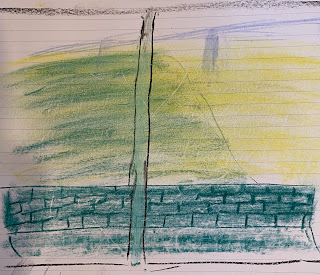I am continuing my journaling journey. This week I started thinking about my learning for the week while cleaning the windows in my living room. One of my sons came in and asked: Don't you have people that do that? Yes, I answered: but I love cleaning the windows occasionally. I get so used to the dirty-ish window that I stop noticing it. I sit in the chair and look outside, accepting the dirty window as part of the view. I literally forget that it is just a distortion that I have some power over and that I can remove.
As I was cleaning, I realized that it was an interesting metaphor that calls on me as a researcher to stop, slow down, and examine what in my process of looking at the world needs cleaning. Is the distortion I see a result of dirt/noise in my control? This can go to weak beliefs and theories that stop me from seeing clearly. It can be unrelated (yet powerful) emotion or just constant activity that prevents me from realizing what I need to be paying attention to.
This may also be true of the devices and apps we use to see the world, algorithms, scanning, and attentional processes obscure what there is to see. Once in a while, we need to stop and clean our windows making sure that we are doing our best to see what is out there. Making what we are seeing is not just the distortion on our window.
This is my Journal page, I noticed that my processing has many more questions than answers or solutions. It could very well be that many of the questions are the ways I am scaffolding my process, or it could be that this early in the research into
Art TEAMS, there are questions with answers pending. Leading to one of the only declarations: I have more questions than answers.
I am still leaning on the firefly metaphor. Systemic change is tough, and most of the time, efforts to innovate and make change are limited to our immediate environment. The light fireflies make is the light of individual change agents. While making the world better for others (very few for a short time), we are also looking for others like us to collaborate with us.
In many ways, the grant is trying to help new fireflies increase their signal, find their light, and join the other fireflies. Yes, there is a slight chance of systemic change, but even if that does not happen, we change ourselves and the lives of our students. The role of projects and universities is to create communities of fireflies. Places where they are safe, cherished and supported, so they can continue.



